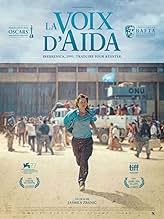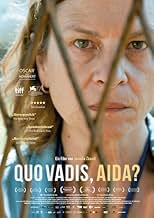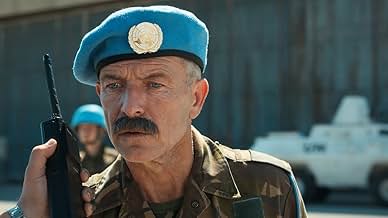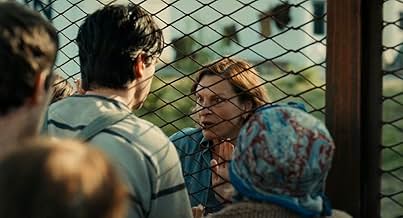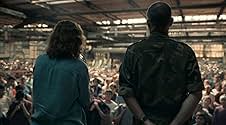AVALIAÇÃO DA IMDb
8,0/10
41 mil
SUA AVALIAÇÃO
Aida é tradutora da ONU na pequena cidade de Srebrenica. Quando o exército dos sérvios de Bósnia toma conta da cidade, sua família está entre os milhares de cidadãos que buscam refúgio.Aida é tradutora da ONU na pequena cidade de Srebrenica. Quando o exército dos sérvios de Bósnia toma conta da cidade, sua família está entre os milhares de cidadãos que buscam refúgio.Aida é tradutora da ONU na pequena cidade de Srebrenica. Quando o exército dos sérvios de Bósnia toma conta da cidade, sua família está entre os milhares de cidadãos que buscam refúgio.
- Direção
- Roteiristas
- Artistas
- Indicado a 1 Oscar
- 40 vitórias e 42 indicações no total
- Direção
- Roteiristas
- Elenco e equipe completos
- Produção, bilheteria e muito mais no IMDbPro
Resumo
Reviewers say 'Quo Vadis, Aida?' is a powerful, harrowing film about the Srebrenica massacre, praised for impactful storytelling and strong performances, especially Jasna Duricic as Aida. It critically examines the United Nations' failure and explores themes of war and survival. While lauded for emotional depth and historical significance, some criticize perceived inaccuracies and over-dramatization. It is considered an important, though challenging, film that highlights a significant historical event.
Avaliações em destaque
The main actress Jasna Djuricic deserves an Oscar. She gave such a great portrayal of a mother and a wife who's traying her best in the worst of situation. God forbid anyone finds themselves in that situation.
The Bosnian entry for the Best International Feature Academy Award, "Quo Vadis, Aida?" is better than the odds-on favorite to actually win the Oscar, "Druk" (a.ka. "Another Round," 2020), being that it's actually about something that matters and is emotionally devastating--so much so that the eponymous Aida literally begs to make a Sophie's Choice at one point. The protagonists in both are teachers, and neither one ultimately affects any real change, but one is living history while the other rambles to high-schoolers about his famous favorite fellow drunkards. Both pictures are alienating: this one forcing us to witness the horrific Srebrenica massacre that we're unable to alter, and the other makes one feel like the designated driver to a bunch of binge-drinking dolts whining about their so-called mid-life crises. As opposed to waiting impatiently to drive the inebriated teachers home, however, "Quo Vadis, Aida?" does well to pull the spectator into the chaos. There's nary a dull moment in following Aida (as played rivetingly well by Jasna Duricic--seriously, Academy, you missed a nominee) around a makeshift UN refugee camp as she frantically tries to save the lives of her husband and two sons from the approaching slaughter by Ratko Mladic's Bosnian Serb Army and as the United Nations and their so-called, shorts-wearing peace keepers impotently stand by and refuse to help.
I want to note, too, that Aida being a translator, or interpreter, as the case may be (that "piano player" as "messenger" part early on, e.g.), makes for an interesting dynamic in the subtitling of the picture, among other things--much of it disregarded as unnecessary because of it. There's actually a good deal of English here beside other languages. Another good reason for the Oscar category name change from "Foreign Language Film" to "International Feature."
Additionally, amid all that, writer-director Jasmila Zbanic and company also do something reflexively interesting cinematically. While the real war is nothing more than a one-sided genocide slaughtering Bosniak Muslim males, there's another battle here for the cinematic control of the narrative. On one side, there's Mladic with the cameraman he continually tells what to shoot, and who in return reassures the would-be convicted war criminal that he'll fix his inane monotony with montage. We never see that film here, though--only its making from the outside, where its propagandistic lies are all the more apparent. And, on the other side, we have the faces of the people in the outer, film proper that is "Quo Vadis, Aida?" We see this in intermittent series of return gazes--of people looking directly, or close to, at the camera and, thus, us, the audience. They're the victims of the genocide within the narrative and, as the case may be, interpreting the real tragedy onto the screen, but through these return gazes, seize control of the narrative. This is their movie.
I want to note, too, that Aida being a translator, or interpreter, as the case may be (that "piano player" as "messenger" part early on, e.g.), makes for an interesting dynamic in the subtitling of the picture, among other things--much of it disregarded as unnecessary because of it. There's actually a good deal of English here beside other languages. Another good reason for the Oscar category name change from "Foreign Language Film" to "International Feature."
Additionally, amid all that, writer-director Jasmila Zbanic and company also do something reflexively interesting cinematically. While the real war is nothing more than a one-sided genocide slaughtering Bosniak Muslim males, there's another battle here for the cinematic control of the narrative. On one side, there's Mladic with the cameraman he continually tells what to shoot, and who in return reassures the would-be convicted war criminal that he'll fix his inane monotony with montage. We never see that film here, though--only its making from the outside, where its propagandistic lies are all the more apparent. And, on the other side, we have the faces of the people in the outer, film proper that is "Quo Vadis, Aida?" We see this in intermittent series of return gazes--of people looking directly, or close to, at the camera and, thus, us, the audience. They're the victims of the genocide within the narrative and, as the case may be, interpreting the real tragedy onto the screen, but through these return gazes, seize control of the narrative. This is their movie.
*Why this film*- This was nominated for the 2021 Best Foreign Film Academy Award, which it lost to Another Round.
Also, I am reading America and the Problem of Hell - an account of genocides of the 20th century. The last genocide that the book extensively talks about, is of the Bosnian Muslims by the Serbians, at Srebrenica. This is set smack in the middle of that tumultuous time.
*What I liked about it* - The pacing and the scripting. It is 100 minute long and packs so much in that century. The chief protagonist, Aida, a UN translator, might be the one of the most true flesh-and-blood characters written for screen. Her personal and professional battles form the crux. The UN soldiers, tasked with enforcing truce between the Bosnians and the Serbs and the Serbian warlords, intent on capturing the city and relocating its citizens are vividly drawn. The acting is so natural that you feel at times that you are watching a documentary, rather than a thriller.
It reminded me of our very own _The Kashmir Files_ at times. The terror that you are being hunted just for your religious identity, is as real here, as it was there. The brutality, much of it off screen here, would make your fertile imagination churn up many scenarios. It is telling that this was sent to the Academy Award by the country whereas The Kashmir Files was reviled by a section of the intelligentsia and political class as conjecture and not fact based.
This is a great film and is surely going to be seared in the memories of those who choose to watch it.
Also, I am reading America and the Problem of Hell - an account of genocides of the 20th century. The last genocide that the book extensively talks about, is of the Bosnian Muslims by the Serbians, at Srebrenica. This is set smack in the middle of that tumultuous time.
*What I liked about it* - The pacing and the scripting. It is 100 minute long and packs so much in that century. The chief protagonist, Aida, a UN translator, might be the one of the most true flesh-and-blood characters written for screen. Her personal and professional battles form the crux. The UN soldiers, tasked with enforcing truce between the Bosnians and the Serbs and the Serbian warlords, intent on capturing the city and relocating its citizens are vividly drawn. The acting is so natural that you feel at times that you are watching a documentary, rather than a thriller.
It reminded me of our very own _The Kashmir Files_ at times. The terror that you are being hunted just for your religious identity, is as real here, as it was there. The brutality, much of it off screen here, would make your fertile imagination churn up many scenarios. It is telling that this was sent to the Academy Award by the country whereas The Kashmir Files was reviled by a section of the intelligentsia and political class as conjecture and not fact based.
This is a great film and is surely going to be seared in the memories of those who choose to watch it.
This is about events around the Srebrenica massacre in 1995. The UN promised that this would be a safe zone, but doesn't back up its ultimatums with action, leaving the small contingent of UN peacekeepers helpless in the face of stronger Serbian forces, who step-by-step get bolder, take over the town, and eventually the civilians seeking safety at the UN base.
I saw this as a digital screening of the Toronto International Film Festival, with writer / director Q+A. The writer put together the story based on actual transcripts, together with survivor stories. Many were composited into the main character Aida. Aida is a translator for the UN troops, and she also tries to keep safe her husband and 2 teenaged sons,. Thus she could move between the "defenders" and the defended, and tell the stories of both.
The characters are well-played and believable, and there are little touches that are illuminating: some flashbacks to pre-war life, a reference to neighbors turning against neighbors, etc. My one complaint is that, as a composite, some events seem to happen too quickly.
I saw this as a digital screening of the Toronto International Film Festival, with writer / director Q+A. The writer put together the story based on actual transcripts, together with survivor stories. Many were composited into the main character Aida. Aida is a translator for the UN troops, and she also tries to keep safe her husband and 2 teenaged sons,. Thus she could move between the "defenders" and the defended, and tell the stories of both.
The characters are well-played and believable, and there are little touches that are illuminating: some flashbacks to pre-war life, a reference to neighbors turning against neighbors, etc. My one complaint is that, as a composite, some events seem to happen too quickly.
... because you never learn! The despicable, diabolical and disgusting events from Srebrenica, replayed many times before, currently playing out in several countries now, and quite probably for the foreseeable future while we continue to turn a blind eye, ignore, disengage or perhaps don't care. Jasna Djuricic as Aida, immense!
Você sabia?
- CuriosidadesJasna Djuricic, who plays the main role, is the wife of Boris Isakovic, who plays general Mladic. They often work together in film and theater, but in this film they don't share any scenes.
- Citações
Aida Selmanagic: We are on the list!
- ConexõesFeatured in A 93ª edição do Oscar (2021)
Principais escolhas
Faça login para avaliar e ver a lista de recomendações personalizadas
- How long is Quo Vadis, Aida??Fornecido pela Alexa
Detalhes
- Data de lançamento
- Países de origem
- Centrais de atendimento oficiais
- Idiomas
- Também conhecido como
- Where are you going, Aida?
- Locações de filme
- Empresas de produção
- Consulte mais créditos da empresa na IMDbPro
Bilheteria
- Orçamento
- € 4.500.000 (estimativa)
- Faturamento bruto mundial
- US$ 813.253
- Tempo de duração
- 1 h 41 min(101 min)
- Cor
- Mixagem de som
- Proporção
- 1.85 : 1
Contribua para esta página
Sugerir uma alteração ou adicionar conteúdo ausente


![Trailer [OV]](https://m.media-amazon.com/images/M/MV5BNjFiN2EzNDItMzBiNy00YjI4LTkwM2YtN2YxYzcwYmYzYjIxXkEyXkFqcGdeQXRyYW5zY29kZS13b3JrZmxvdw@@._V1_QL75_UX500_CR0)

